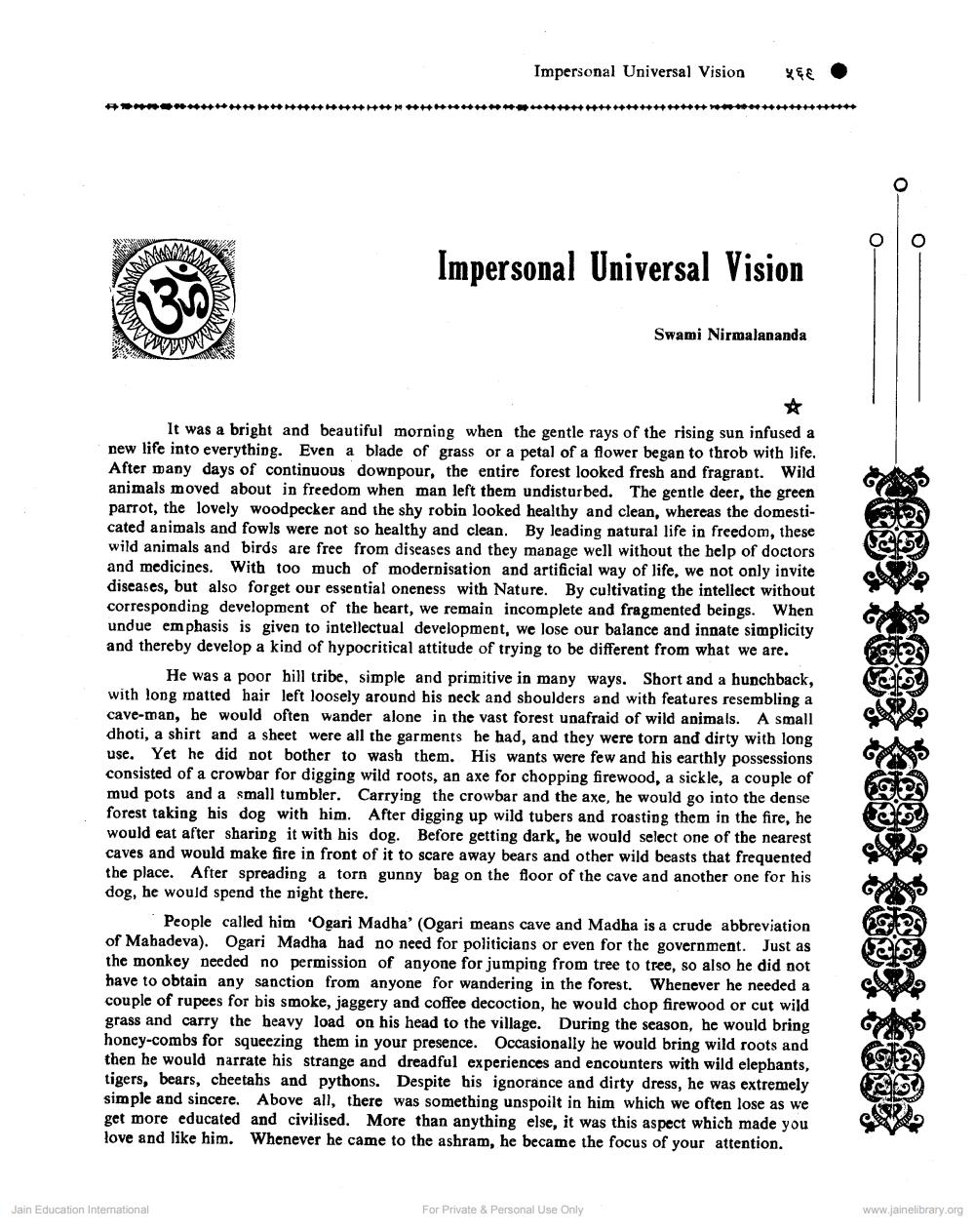________________
Amma
MAMMA
Impersonal Universal Vision ५६६
Jain Education International
Impersonal Universal Vision
☆
It was a bright and beautiful morning when the gentle rays of the rising sun infused a new life into everything. Even a blade of grass or a petal of a flower began to throb with life. After many days of continuous downpour, the entire forest looked fresh and fragrant. Wild animals moved about in freedom when man left them undisturbed. The gentle deer, the green parrot, the lovely woodpecker and the shy robin looked healthy and clean, whereas the domesticated animals and fowls were not so healthy and clean. By leading natural life in freedom, these wild animals and birds are free from diseases and they manage well without the help of doctors and medicines. With too much of modernisation and artificial way of life, we not only invite diseases, but also forget our essential oneness with Nature. By cultivating the intellect without corresponding development of the heart, we remain incomplete and fragmented beings. When undue emphasis is given to intellectual development, we lose our balance and innate simplicity and thereby develop a kind of hypocritical attitude of trying to be different from what we are.
Swami Nirmalananda
He was a poor hill tribe, simple and primitive in many ways. Short and a hunchback, with long matted hair left loosely around his neck and shoulders and with features resembling a cave-man, he would often wander alone in the vast forest unafraid of wild animals. A small dhoti, a shirt and a sheet were all the garments he had, and they were torn and dirty with long use. Yet he did not bother to wash them. His wants were few and his earthly possessions consisted of a crowbar for digging wild roots, an axe for chopping firewood, a sickle, a couple of mud pots and a small tumbler. Carrying the crowbar and the axe, he would go into the dense forest taking his dog with him. After digging up wild tubers and roasting them in the fire, he would eat after sharing it with his dog. Before getting dark, he would select one of the nearest caves and would make fire in front of it to scare away bears and other wild beasts that frequented the place. After spreading a torn gunny bag on the floor of the cave and another one for his dog, he would spend the night there.
People called him 'Ogari Madha' (Ogari means cave and Madha is a crude abbreviation of Mahadeva). Ogari Madha had no need for politicians or even for the government. Just as the monkey needed no permission of anyone for jumping from tree to tree, so also he did not have to obtain any sanction from anyone for wandering in the forest. Whenever he needed a couple of rupees for his smoke, jaggery and coffee decoction, he would chop firewood or cut wild grass and carry the heavy load on his head to the village. During the season, he would bring honey-combs for squeezing them in your presence. Occasionally he would bring wild roots and then he would narrate his strange and dreadful experiences and encounters with wild elephants, tigers, bears, cheetahs and pythons. Despite his ignorance and dirty dress, he was extremely simple and sincere. Above all, there was something unspoilt in him which we often lose as we get more educated and civilised. More than anything else, it was this aspect which made you love and like him. Whenever he came to the ashram, he became the focus of your attention.
For Private & Personal Use Only
www.jainelibrary.org




